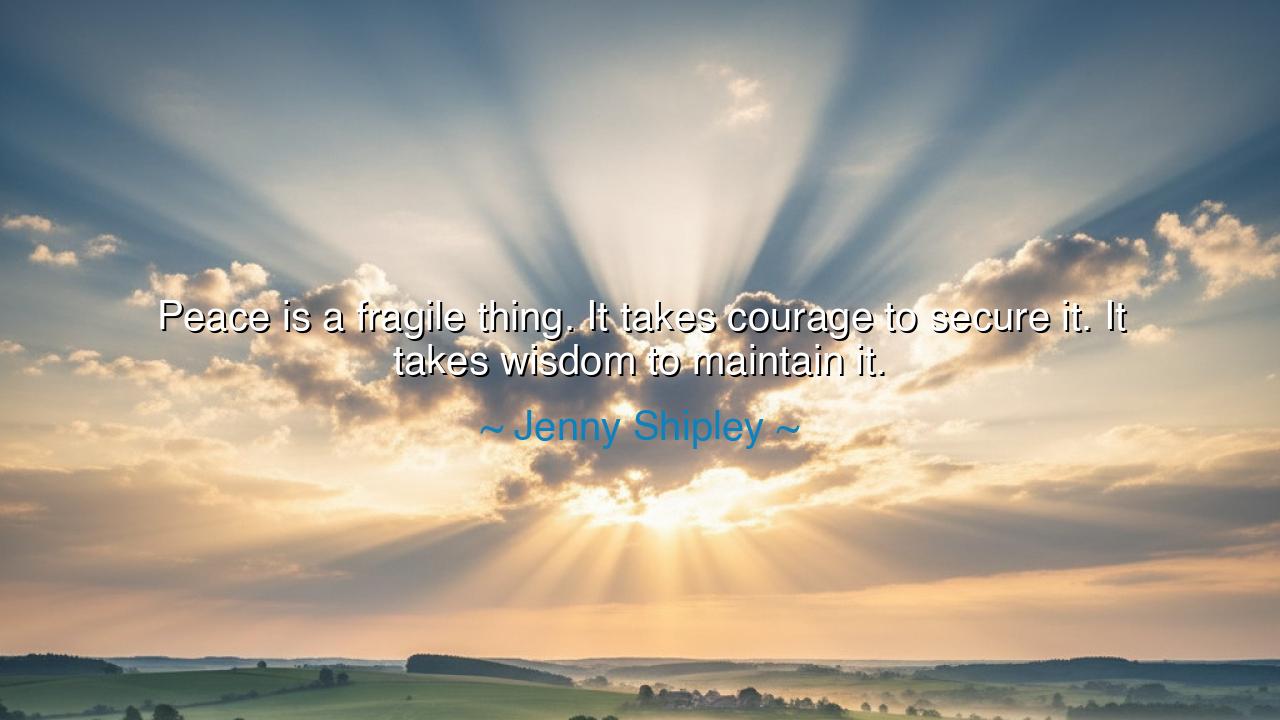
Peace is a fragile thing. It takes courage to secure it. It takes
Peace is a fragile thing. It takes courage to secure it. It takes wisdom to maintain it.






“Peace is a fragile thing. It takes courage to secure it. It takes wisdom to maintain it.” Thus spoke Jenny Shipley, the first woman to serve as Prime Minister of New Zealand, whose life in public service taught her the delicate art of balance between strength and compassion. Her words, though spoken in the modern age, echo the ancient truths of every civilization that ever rose from chaos into harmony. For peace, as she reminds us, is not the natural state of the world—it is a flame trembling against the winds of pride, fear, and ambition. It must be secured by the brave and sustained by the wise.
From the beginning of time, mankind has waged war more easily than it has kept peace. War is the child of impulse—swift, fiery, and blind. But peace is the daughter of discipline, born only from courage, patience, and restraint. To secure peace demands bravery no lesser than that of the soldier, for it is not the courage of battle, but the courage of restraint—the courage to forgive, to yield, to see the humanity of an enemy. Jenny Shipley’s insight carries this ancient understanding: that the true hero is not the one who conquers, but the one who reconciles.
Consider the tale of Nelson Mandela, who, after twenty-seven years of imprisonment, emerged not to avenge his suffering but to extend his hand to those who had oppressed him. South Africa stood upon the edge of civil war, its people divided by centuries of hatred. Yet Mandela, with a heart forged in fire, chose peace over vengeance. His courage was not that of the sword, but of the spirit. He understood, as Shipley did, that peace requires the strength to silence one’s anger and the vision to see beyond the wounds of the past.
But courage alone is not enough. “It takes wisdom to maintain it,” Shipley said—and here lies the deeper mystery. Once peace is won, it must be tended like a fragile garden, ever threatened by weeds of greed, suspicion, and pride. The wise know that peace is not a fixed state but a living process, sustained through understanding, justice, and compassion. It must be renewed daily—in words, in decisions, in the quiet choices that shape the fate of nations and families alike. Without wisdom, peace decays into complacency, and complacency into conflict.
History bears witness to this truth. After the First World War, the victors carved treaties from vengeance rather than wisdom. The peace they forged was brittle and short-lived, for it was built upon humiliation, not healing. Two decades later, the world was again in flames. In contrast, after the Second World War, leaders with greater wisdom—men and women who had seen the cost of hatred—laid foundations of unity through cooperation, rebuilding, and forgiveness. Thus was born a more enduring peace, sustained by institutions of dialogue rather than domination.
On a smaller scale, this same law governs our daily lives. Within families, communities, and the hearts of individuals, peace must be guarded with vigilance. It is easy to destroy with a harsh word what took years of kindness to build. It is easy to turn away in anger rather than seek understanding. But those who would live wisely must practice the art of peacekeeping—listening before judging, forgiving before striking, and remembering always that to preserve harmony is not weakness, but strength refined.
So, my children of the coming age, take heed of this truth: peace is fragile, and its guardians must be both brave and wise. Let your courage defend it when fear and hatred arise, and let your wisdom nurture it when comfort breeds neglect. In your homes, your friendships, and your nations, be the keepers of this sacred balance. Do not mistake quietness for peace, nor forget that true peace is born from justice and sustained by compassion.
For the warrior who fights for peace and the sage who preserves it walk the same path—the path of harmony that binds heaven and earth. Remember the words of Jenny Shipley, and let them guide you: have the courage to create peace, and the wisdom to make it last. For in the end, all greatness leads not to conquest, but to calm—the calm of hearts that have chosen understanding over destruction, and love over fear.






AAdministratorAdministrator
Welcome, honored guests. Please leave a comment, we will respond soon